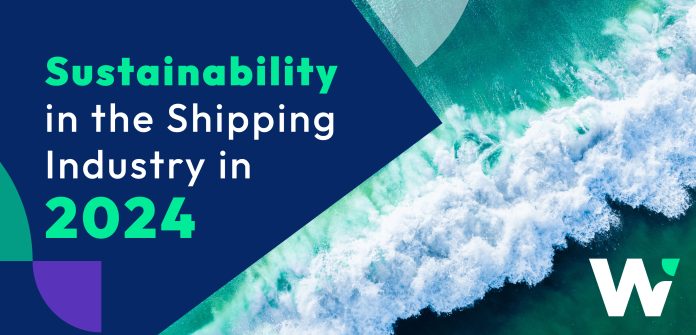In the global pursuit of sustainability, industries worldwide are placing an increasing emphasis on eco-friendly practices, recognizing the crucial role each sector plays in the collective effort.
The shipping industry is not simply catching up; it is forging ahead in the digital revolution, with sustainability as its main objective in the year 2024.
As the shipping industry critically aligns itself with the global momentum for a more sustainable future, it ensures that it doesn’t lag behind in the era of digitization.
This article delves into the significance of forging partnerships that prioritize sustainability. Through collaboration with WaveBL, major carriers are actively incorporating eco-friendly practices into their operations, showcasing their dedication to a sustainable, efficient future.
| The significance of embracing sustainability cannot be overstated. The time to leverage innovative solutions to navigate toward a more sustainable and responsible future for the shipping industry is now. |
The Green Wave: How The World Embraces The Digital Era
As the world collectively steers towards sustainability, the shipping industry is finally embracing a significant shift with a substantial boost in the digitization of paper-based documents. The drive for this change comes on the heels of the UK’s recent legal endorsement of electronic documents in trade, a move that extends beyond a mere regulatory adjustment to act as a true catalyst for transformative change.
Digitization is a critical part of this evolution, enhancing trade efficiency during the rapidly changing global landscape. Various companies have adopted digital technologies, incorporating blockchain, robotics, and drone technologies to enhance existing processes. A significant focus has been on digitalizing crucial trade documents, such as bills of lading, which account for a substantial portion of total trade documentation costs.
Moving towards digitalization, particularly the use of electronic bills of lading (eBL), has not only reduced paper waste but also increased visibility and provided secure, reliable, and cost-efficient shipping and logistics services.
Having explored the current state of the shipping industry, let’s now delve into specific actions that can shape a more sustainable future.
How to Take Action for a Sustainable Future
Here are actions to ensure a more sustainable and responsible future for the shipping industry:
- Invest in Green Technologies: Explore and adopt eco-friendly technologies, such as energy-efficient vessels and renewable energy sources.
- Advocate for Regulatory Compliance: Support and adhere to international regulations promoting environmental responsibility and sustainable shipping practices.
- Promote Sustainable Supply Chains: Collaborate with stakeholders to establish responsible sourcing, waste reduction, and ethical labor practices.
- Enhance Port Infrastructure: Upgrade port facilities to accommodate eco-friendly vessels and implement sustainable waste management systems.
- Encourage Digitalization: Continue the shift towards digitalization, embracing electronic bills of lading (eBL) and blockchain for a paperless and efficient future.
- Educate and Raise Awareness: Develop educational programs to raise awareness about sustainable practices and promote a culture of responsibility.
- Collaborate for Collective Impact: Foster partnerships with governments, NGOs, and industry associations to collectively address sustainability challenges.
- Monitor and Report Impact: Implement robust monitoring systems to track and analyze environmental impact, setting goals for continuous improvement.
Now, let’s spotlight WaveBL’s contributions to steering the industry towards sustainability through cutting-edge solutions
WaveBL’s Role in Greening the Shipping Industry
WaveBL stands at the forefront of the global effort, steering the transformation towards sustainability through cutting-edge solutions, with a key emphasis on blockchain technology.
- Blockchain Integration: By embracing blockchain, WaveBL is not only reducing reliance on paper but also significantly minimizing the carbon footprint associated with traditional shipping practices. This shift is pivotal in aligning the industry with environmentally responsible practices.
- Innovative Solutions: WaveBL’s innovative solutions are designed to streamline and modernize operations, bringing efficiency and sustainability to the forefront.
- Digitization of Trade Documents: The digitization of trade documents plays a crucial role in this process, ensuring a seamless transition from traditional paper-based practices to a more eco-friendly and technologically advanced model.
- Evolving the Bill of Lading: Reducing reliance on paper is not just a practicality; it’s a commitment to environmental responsibility. The traditional bill of lading, a significant contributor to trade documentation costs, is being transformed through the adoption of electronic bills of lading (eBL) facilitated by WaveBL. This not only contributes to cost efficiency but also marks a substantial reduction in paper waste.
- Positive Environmental Impact: The positive impact of WaveBL’s focus on blockchain technology and digitization extends beyond the immediate operational benefits. It sets the stage for a greener tomorrow, fostering a more sustainable and responsible future for the shipping industry.
Blockchain as a Catalyst for Sustainability
At the core of WaveBL, blockchain stands as a formidable force propelling sustainability in the shipping industry. More than just digitization, this transformative technology reshapes operations, elevating transparency, traceability, and accountability.
- Unprecedented Transparency: Introducing unprecedented levels of transparency, blockchain enhances visibility into shipping processes.
- Traceability and Accountability: Ensuring the traceability of every transaction, blockchain establishes a high level of accountability in shipping operations.
- Reduced Reliance on Paper: Actively reducing reliance on traditional paper processes, blockchain contributes to minimizing the environmental impact of paper usage.
- Foundation for Environmental Responsibility: Establishing a foundational shift toward environmentally responsible practices, blockchain marks a paradigm shift in the industry’s sustainability approach.
These blockchain-driven benefits foster a culture of responsibility and environmental consciousness, steering the shipping industry toward a more sustainable and eco-friendly future.
Setting Sail for a Greener Tomorrow
As major carriers actively incorporate these sustainable practices, the industry witnesses a significant shift towards transparency, traceability, and reduced reliance on traditional paper processes. The positive environmental impact is undeniable, with each step contributing to a greener and more sustainable future.
WaveBL’s role in steering this transformation is not merely about efficiency and cost reduction; it signifies a commitment to environmental responsibility. As we set sail for a greener tomorrow, it is essential for businesses and stakeholders to recognize the collective responsibility of embracing sustainable practices.
What actions will you take to ensure a more sustainable and responsible future for the shipping industry?







